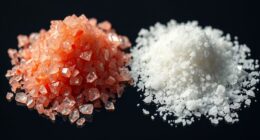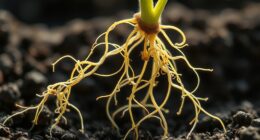Magnesium sulfate, or Epsom salt, is a water-soluble mineral made of magnesium, sulfur, and oxygen, with a crystalline look. It quickly dissolves in water, making it easy to apply as a fertilizer through foliar sprays or soil mixing. It boosts plant growth by providing essential nutrients for photosynthesis and protein production. Using it properly supports healthy soil and plants, and if you’re interested in its safe application and environmental impact, there’s more to explore here.
Key Takeaways
- Magnesium sulfate is a water-soluble compound providing essential magnesium and sulfur nutrients for plants.
- It appears as colorless crystalline granules or powder with high purity for safe agricultural use.
- Used as a fertilizer via foliar spraying or soil incorporation to enhance crop growth and soil health.
- Its quick dissolution in water ensures efficient nutrient uptake and supports photosynthesis.
- Proper handling, storage, and application rates are vital to prevent environmental issues and optimize benefits.
Chemical Composition and Physical Characteristics

Magnesium sulfate, commonly known as Epsom salt, is a chemical compound composed of magnesium, sulfur, and oxygen. Its chemical formula is MgSO₄, and it appears as colorless, crystalline granules or powder. The mineral’s purity is vital for agricultural applications, ensuring it contains minimal impurities that could affect soil health. When applied to soil, magnesium sulfate influences soil pH, typically slightly lowering it, which can benefit certain crops. Its physical characteristics include high solubility in water, making it easy to dissolve and apply. The mineral’s purity guarantees consistent quality, while its physical form allows for efficient dispersion in soil. Additionally, HEPA filtration technologies are often used in agricultural environments to improve air quality during storage and processing, ensuring a safer handling process. Understanding these properties helps you optimize its use, ensuring effective nutrient delivery without compromising soil chemistry, especially in precision agriculture practices aimed at maximizing crop yields.
Solubility and Handling Properties

Have you ever wondered how easily magnesium sulfate dissolves and how to handle it effectively? It dissolves quickly in water, creating a clear, concentrated solution ideal for agricultural use. Its high solubility ensures efficient absorption by plants when applied as a fertilizer. Proper handling precautions include wearing gloves and eye protection to prevent irritation, especially when handling large quantities. Store magnesium sulfate in a cool, dry place to maintain its storage stability; moisture exposure can cause clumping and degradation. Storage conditions are important to prevent contamination and moisture ingress. Keep containers sealed tightly to prevent contamination and moisture ingress. Handling with care ensures safety and preserves product quality. Understanding these solubility and handling properties helps you apply magnesium sulfate effectively while maintaining safety and product longevity. Additionally, being aware of its solubility in water can help optimize its use for various applications.
Nutritional Benefits for Plants

Because magnesium sulfate dissolves readily in water, it becomes an accessible source of magnesium and sulfur for plants. These nutrients are crucial for overall growth, helping to enhance soil enrichment and promote healthy development. Magnesium is a core component of chlorophyll, so it directly influences photosynthesis and energy production. Sulfur supports protein synthesis and enzyme function, further boosting plant vitality. When you supply magnesium sulfate, you improve nutrient availability in the soil, leading to stronger root systems and better resistance to stress. Additionally, magnesium sulfate can mitigate deficiencies caused by soil imbalances or high soil pH, ensuring plants receive adequate nutrients. This, in turn, can increase crop yield by fostering more vigorous plant growth. Using magnesium sulfate as a supplement ensures your plants receive essential nutrients efficiently, supporting ideal production and healthier, more productive crops. Proper nutrient management is essential for maintaining optimal plant health and maximizing agricultural productivity.
Methods of Application in Agriculture

There are several effective methods to apply magnesium sulfate in agriculture, each tailored to specific crop needs and soil conditions. Foliar spraying is a quick way to deliver magnesium directly to plant leaves, especially during nutrient deficiencies or rapid growth stages. It allows for rapid absorption and can be applied easily to a wide range of crops. Soil incorporation involves mixing magnesium sulfate into the soil, either through broadcasting or banding, to improve overall soil fertility and ensure sustained nutrient availability. This method benefits crops with deeper root systems or in soils with magnesium deficiencies. Combining foliar spraying for immediate correction and soil incorporation for long-term health provides a balanced approach, maximizing crop yield and health while maintaining soil quality. Additionally, understanding the contrast ratio of your application method can help optimize visual indicators of nutrient uptake and plant health.
Environmental and Safety Considerations

Applying magnesium sulfate requires careful attention to environmental and safety considerations to prevent unintended harm. You should be aware of potential pesticide interactions that could reduce effectiveness or create harmful residues. Avoid over-application, as excess magnesium sulfate can lead to soil contamination, disrupting soil health and microbial activity. When handling the chemical, wear protective gear to prevent skin or eye irritation. Be cautious with storage to prevent leaks or spills that could contaminate groundwater or nearby water sources. Always follow recommended application rates and timing to minimize environmental impact. Regular testing of soil helps ensure magnesium levels stay balanced without risking contamination. Additionally, understanding ethical hacking techniques can help safeguard your agricultural data and systems from cyber threats. Proper training in pesticide safety procedures is essential to minimize risks associated with handling chemicals. To further reduce environmental impact, consider implementing integrated pest management strategies that promote sustainable practices. By taking these steps, you protect both your crops and the environment, ensuring safe, sustainable use of magnesium sulfate.
Frequently Asked Questions
How Does Magnesium Sulfate Influence Soil Ph Levels?
You might wonder how magnesium sulfate influences soil pH levels. When applied, it generally doesn’t cause significant soil pH adjustment, making it suitable for maintaining balanced conditions. Its primary benefit is enhancing nutrient availability, especially magnesium and sulfur, which support plant growth. By improving nutrient uptake, magnesium sulfate helps optimize soil health without disrupting pH, ensuring your crops receive essential nutrients efficiently.
Can Magnesium Sulfate Be Used in Organic Farming Systems?
You can use magnesium sulfate in organic farming systems because it’s considered a natural supplement, aligning with organic certification standards. It provides essential magnesium and sulfur to plants without synthetic chemicals, helping improve soil health and crop growth. Since it’s approved for organic use, you can confidently incorporate magnesium sulfate into your practices to enhance plant nutrition while maintaining organic certification requirements.
What Are the Signs of Magnesium Deficiency in Crops?
You can identify magnesium deficiency in your crops through symptom identification, which often shows as interveinal chlorosis—yellowing between the veins of older leaves. You might also notice stunted growth and poor yield. To prevent deficiency, make sure proper soil testing and consider applying magnesium sources like magnesium sulfate when needed. Regular monitoring helps you catch deficiencies early, maintaining healthy, productive plants and avoiding long-term crop damage.
How Does Magnesium Sulfate Interact With Other Fertilizers?
Imagine your soil as a delicate dance floor, where each fertilizer must move in harmony. Magnesium sulfate interacts smoothly with other fertilizers, ensuring soil nutrients blend seamlessly without conflict. Its compatibility depends on fertilizer compatibility and proper application timing. You control this rhythm, preventing nutrient clashes that can hinder crop growth. By understanding these interactions, you keep your soil’s symphony balanced, nurturing healthy, thriving plants.
Are There Crop-Specific Recommendations for Magnesium Sulfate Application?
You should follow crop-specific guidelines for magnesium sulfate application to optimize growth and yield. The timing of application is essential; it’s best to apply during key growth stages, such as planting or early vegetative phases. Different crops have unique nutrient needs, so consult local recommendations or a soil test to determine the proper amount and timing, ensuring your plants get the magnesium they require without over-application.
Conclusion
In summary, magnesium sulfate is a versatile and essential supplement for your garden, helping plants thrive just like a trusty steed in a knight’s tale. With its easy application and numerous benefits, you can boost crop yields and guarantee healthy growth. Just be mindful of proper handling and environmental care, and you’ll be well on your way to a flourishing garden—no need to summon Merlin, just good practice!









